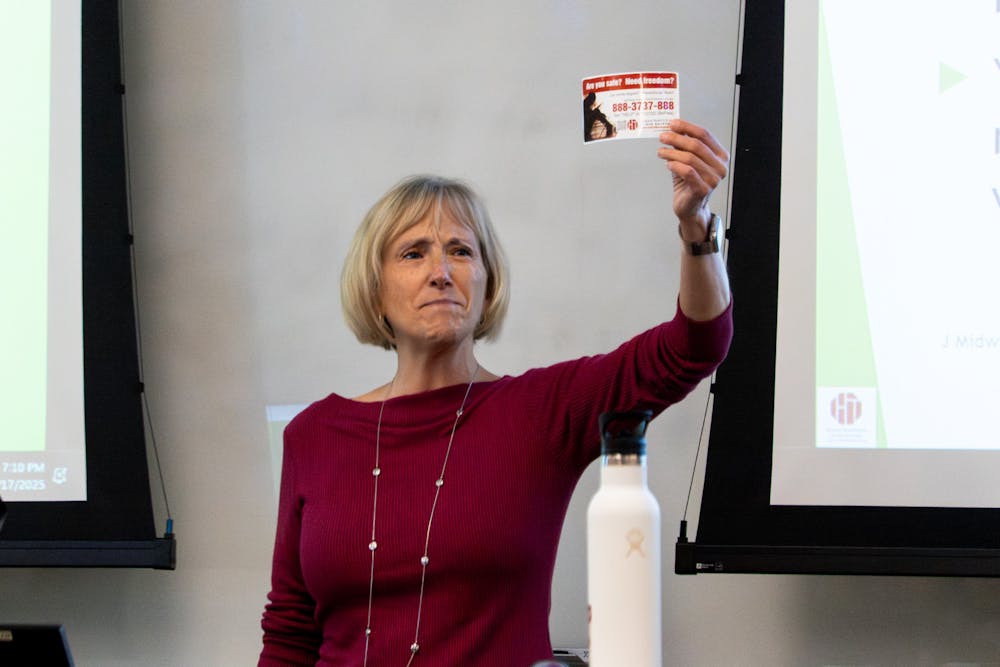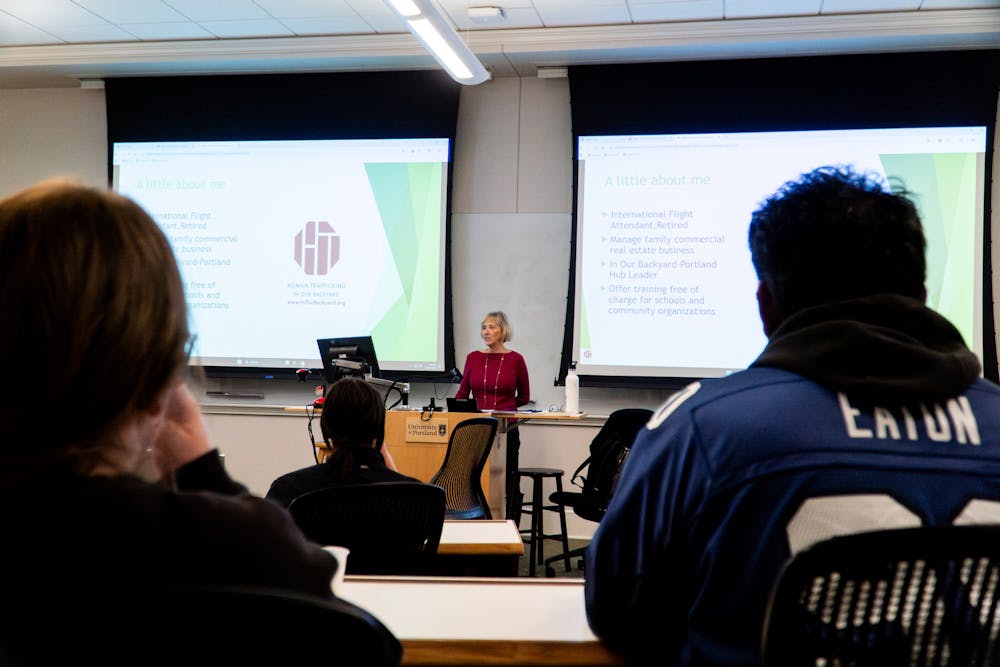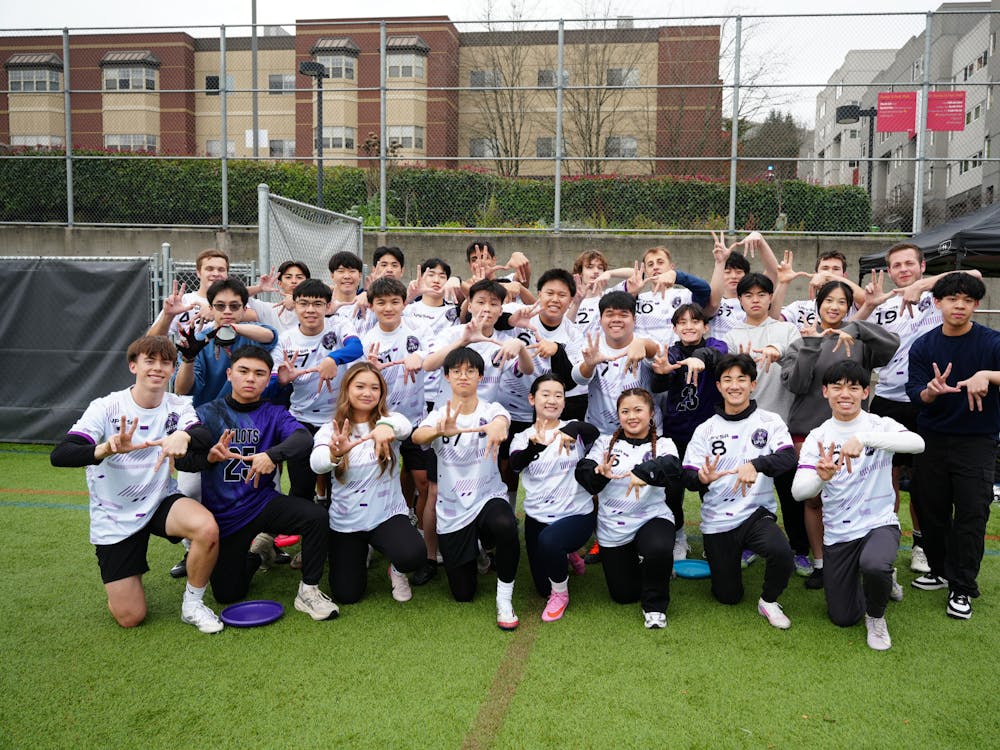In convenience store restrooms or airport lavatories, you might see freedom stickers. These stickers, with phone numbers and QR codes to trafficking hotlines, are created by In Our Backyard, an anti-human trafficking organization.
On Nov. 17, the Social Justice Club (SJC) hosted Sharon Brown, the Portland-hub leader of In Our Backyard. Brown presented on human trafficking, how it happens, warning signs to watch for and how to protect yourselves and your community.
“Like the [organization’s] name says, [human trafficking is] everywhere,” Brown said. “It's in our backyard. It's not just someplace else.”
Brown opened her presentation by mentioning that human trafficking is not only sex trafficking but any type of forced or coerced labor or servitude. It can happen to anyone, regardless of age or sex.
While exact statistics on trafficking are hard to come by, Brown says there are an estimated 50 million people in “modern-day slavery,” or trafficking, worldwide.
“It's the world's fastest growing criminal enterprise, valued at $245 billion,” Brown said at the event. “Sex trafficking is about $170 billion of that [and] forced labor is $75 billion.”
Abigail Rios, a senior nursing major, attended the event per her professor’s recommendation. For this event, SJC invited members of the UP Student Nurses Association, as trafficking information can be critical for medical professionals to know.
For Rios, the biggest takeaway was learning about trafficking indicators and how to respond to suspected trafficking. Before this presentation, she says she would not have known how to approach a trafficking situation, but now feels more prepared.
Indicators of human trafficking can be many things, but Brown encouraged students to look beyond obvious physical injuries or illnesses, like bruises or trafficking tattoos, and try to identify underlying trauma.
She explained the four trauma responses that might occur during trafficking: fight, flight, freeze and fawning. Fawning is a common reaction in which the victim does not resist the abuse in order to survive.

For those in the medical field, questions to consider include whether the patient can move freely, if they are frightened to answer, whether they avoid eye contact, if they are confused about common knowledge or if they look for approval before answering.
The bottom line, however, is to trust your gut, Brown says. If something doesn’t feel right, whether that’s in an emergency room or out and about, listen to that instinct and report it.
“The goal, if you're working in the healthcare environment, is not to elicit a disclosure, but maybe to gather some information, and then you report it,” Brown said.
Emma Hayes, president of SJC and a junior social work and Spanish major, reiterates that it’s not an individual’s job to be a superhero in these situations, as intervention can sometimes cause more harm than good for the intervener and the victim.
Instead, it’s your job, in the medical field and beyond, to make the victim feel seen and to provide proper resources for them to find safety on their own terms, she says.
“Human trafficking runs on isolation and fear,” Hayes said. “If we build communities that support each other and see each other and listen, people can’t be trafficked.”
While Brown and Hayes recognize that responding to human trafficking can feel overwhelming, they don’t want students to feel paranoid, but rather involved in prevention. And one way to do that is through freedom stickers.
“If there's anything that you take away tonight, and you think, ‘I want to do something,’ this is like the easiest, cheapest thing to do,” Brown said. “It's got a huge impact on people.”
According to Brown, public restrooms are the only place victims are allowed to be alone, so these stickers in a stall can change their lives.
Before placing a sticker in a restroom, however, be sure to ask the establishment for permission, as unwarranted sticking is vandalism.
Most importantly, Brown reiterates the best thing you can do is be aware.
“Just take care of yourself and take care of victims and do what you can do,” Brown said. “I mean, just open up your eyes.”
For more information, SJC meets every Tuesday at 7 p.m. in Franz 025.
Kaylee Monahan is the Copy and Opinions Editor for The Beacon. She can be reached at monahan26@up.edu.








